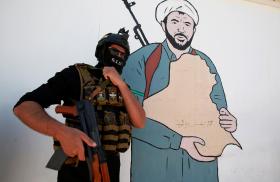When the European Union (EU) initiated accession talks with Turkey in October, some Western commentators suggested that a major underlying issue is the relationship between the West and the Muslim world. How is this issue viewed in the Arab press, and what significance is seen for the relationship between Europe and Arab nations? The following is a collection of statements about Turkey's EU accession from the Arab press.
Turkey Belongs in Europe
Erfan Nezam-adden, "Turkey and Europe, the Conflict of Civilizations," al-Hayat (London), November 14: "Will we witness the fall of the theories of [clashing] civilizations after moving the barriers from the way of Turkey joining the EU? . . . Also, there are some people who consider Turkey as not a Muslim country; if it joins the EU that would be a normal thing, because Turkey is not a part of the Islamic world."
Walid M. Sadi, "Revisiting Turkey's EU Membership," The Jordan Times (Amman), October 16: "As for remaking the Turkish people into something other than what they are, Turkey can and should be adamant and unyielding. Europe is already a multicultural world, with millions of its citizens belonging to various religions, cultures, and ways of life. These people were invited into Europe and allowed to settle within its borders. It is now projected that by the year 2050, Muslim Europeans may constitute about one-fourth of the entire European population, if not more. The kind of Europe that Turkey may enter by 2014 would no longer be an exclusive club of nations belonging to a homogenous culture or way of life. Europe stands to benefit from Turkey's membership for this reason as well."
"Turkey's European Membership" Gulf News (Dubai), October 8: "No one expects this to happen for at least ten years, but there is no denying that this is a significant moment in European history. No country that has started the process of EU accession has ever failed to be granted membership. While the EU's twenty-five heads of government have the final word on when talks will start in earnest at their December summit, an unstoppable momentum is now gathering."
Editorial, "Crushing Turkey's Hopes for EU Entry Is a Death Sentence for Its Reform Drive," The Daily Star (Beirut), September 29: "Although the European Parliament's resolution to add new conditions to Turkey's accession to the European Union will not affect the start of negotiations toward this end, the move was yet another example of Europe's deep reluctance to welcome Turkey into the union. . . . We have already seen the benefits of Europe's engagement with Turkey. To get this far in the process, Turkey has made great strides in implementing a number of wide-ranging political reforms. . . . But keeping the process of negotiations alive will ensure that there is continued progress on these and other fronts. Breaking away from this process prematurely, however, would be a recipe for disaster. Without the goal of membership in view, there is little motivation for Turkey to continue on its current path."
Turkey Is Too Different from Europe
Ghassan Charbel, al-Hayat (London), October 7: "Many of the continent's states, as well as the architects of its dream of union, have doubts about Turkey's European belonging. Some have said that even if a part of Turkey is in Europe, this does not change the reality that Turkey lacks European roots in its culture and traditions. . . . With the European Commission's approval to begin negotiations regarding Turkey's accession to the EU, a new phase begins. . . . It is obvious that Turkey must change in order to join the European club. It is also clear that its accession would change the club's mood."
Tarik Hammo, "Turkey and Europe: Self-Deception for More Years," Elaph (London), October 4: "Turkish accession to the EU will not be achieved as some analysts hope. Because of the religious values of Turkey's rural Muslim society, it will be hard to merge Turks into European society."
Amer Taheri, "The Turks Are Coming! Maybe . . ." al-Sharq al-Awsat (London), August 10: "The argument for Turkey becoming a member of the EU is full of holes. To start with, most Turks hate seeing their nation described as a mere bridge, meaning it either has no personality of its own or suffers from cultural schizophrenia. . . . At the same time, Turkey plays only a marginal role in current Islamic culture and literature, not to mention theology and philosophy. This is not only due to the fact that Turkey has been a radically secular republic for more eighty years. The real reason is that Turkish writers, poets, and other producers of culture are more interested in Europe than in Islam. Over the past half a century, Turkey has produced at least half a dozen poets and writers of world stature. Not one can be described as Islamic."
How Will Turkey's EU Membership Affect the Middle East?
Walid M. Sadi "Revisiting Turkey's EU Membership," The Jordan Times (Amman), October 16: "Turkey can be the bridge between the Middle East and . . . Brussels, where decisions with far-reaching consequences are taken. Considering this, . . . Middle Eastern countries should rally in support of Turkey's membership, because they stand to gain politically, economically, and culturally. But as important as all these considerations and implications are for Turkey and the Middle East region, Turkey's membership must not come at any price. It would be only fair that Turkey were not only imposed conditions but set its own [conditions] as well."
Editorial, "A European Turkey Stands to Be a Guiding Light for the Muslim World," The Daily Star (Beirut) October 8: "A decade may sound a long time, but the ball is finally rolling on Turkey's EU membership after forty years of wavering talks. . . . Turkey will now be undergoing major changes, which will eventually, inevitably, affect the region, Syria and Iraq in particular. Besides help from Europe, Turkey will also need help from the region, and the best way the Arab and Islamic worlds can help -- and benefit themselves -- is to participate in Turkey's economic, social, and political transformation. How Turkey develops as an incubator of Islam in the modern Western world will be one of the most fascinating aspects of the ten-year transition period to full EU membership -- presuming the accession process is carried through to a successful conclusion."
Amer Taheri, "The Turks Are Coming! Maybe . . ." al-Sharq al-Awsat (London), August 10: "In fact, there is no evidence that Turkey is such a bridge, if only because its relations with the Muslim world, including its immediate neighbors Iran, Iraq, and Syria, remain minimal."
Al-Akhbar Daily (Cairo), May 4: "Turkey's weight in the region qualifies it to play an active role in resolving the Arab-Israeli conflict in return for Israel's assistance to bring Turkey into the European Union."
Why Does Turkey Want to Join the EU?
Tarik Hammo, "Turkey and Europe: Self-Deception for More Years," Elaph (London), October 4: "The talk on Europe and joining the Christian club has many frames. First, Turkey's current government is seeking to weaken the military . . . as the power . . . in the country. Second, Ankara seeks more economic aid to rescue the Turkish economy from stagnation and push the country toward greater prosperity. Third, the Turkish government seeks to infiltrate the European industrial heart through participation in political decisionmaking."
Abdullah Hamoudeh, al-Watan (Oman), November 15: "If we look to Turkey from the historical side, we will see that Turkey has been through many conflicts with Christian Europe, and the remnants of those conflicts are stuck in the European mind. Many Europeans believe that if Turkey succeeds in joining the EU, it would strengthen its power in Europe without using military means."
This selection of quotations was prepared by Ghaith al-Faqih, a research assistant at The Washington Institute.
Policy #1067

